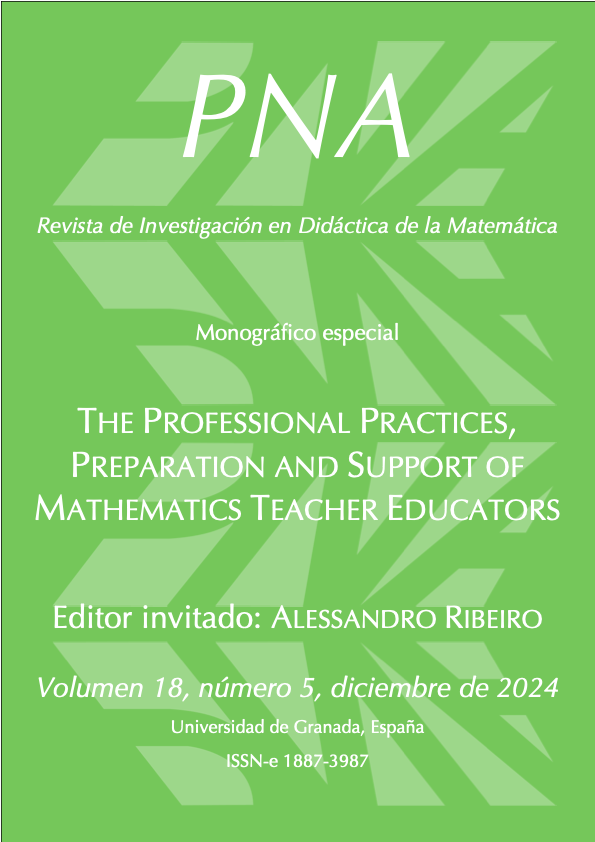O modelo MTSK como suporte para o crescimento profissional do formador de professores
DOI:
https://doi.org/10.30827/pna.v18i5.29828Palavras-chave:
Aprendizagem, Crescimento profissional, Formado de professores, Matemática, MTSKResumo
Nesta pesquisa, pretendemos descrever aspectos que abordem o MTSK como suporte no crescimento profissional do formador de professores. Realizamos um estudo de caso envolvendo uma formadora de futuros professores do ensino fundamental. Nossa fonte de coleta de informações é por meio de questionários. Os resultados principais do crescimento profissional são apresentados em termos de domínios pessoais, externos, de prática e de consequência. O uso e fortalecimento do MTSK podem promover o crescimento profissional no formador de professores, possibilitando aprendizado, mudanças contínuas e duradouras no aprimoramento da prática como formador de profesores.
Downloads
Referências
Abell, S., Rogers, M., Hanuscin, D. L., Lee, M., y Gagnon, M. (2009). Preparing the next generation of science teacher educators: A model for developing PCK for teaching. Journal of Science Teacher Education, 20(1), 77-93. https://doi.org/10.1007/s10972-008-9115-6 DOI: https://doi.org/10.1007/s10972-008-9115-6
Berry, A. (2007). Tensions in Teaching about Teaching. Developing Practice as a Teacher Educator. Springer. DOI: https://doi.org/10.1007/1-4020-5993-0
Berry, A. (2016). Teacher educators’ professional learning: A necessary case of ‘on your own’? En B. De Wever, B. R. Vanderlinde, M. Tuytens y A. Aelterman (Eds.), Professional learning in education: Challenges for teacher educators, teachers and student teachers (pp. 39-56). Ginko Press y Academia Press.
Beswick, K. (2020). Mathematics teacher educators as developing professionals. Un introduction. En K. Beswick y O. Chapman (Eds.), International handbook of mathematics teacher education (Vol. 4): The mathematics teacher educator as a developing professional (pp. 1-11). Brill Sense. DOI: https://doi.org/10.1163/9789004424210_001
Carrillo J., Climent, N., Montes, M., Contreras, L.C., Flores-Medrano, E., Escudero-Ávila, D., Vasco, D., Rojas, N., Flores, P., Aguilar-González, Ribeiro, M., y Muñoz-Catalán, M. (2018). The mathematics teacher’s specialised knowledge (MTSK) model. Research in Mathematics Education, 20(3), 236-253. https://doi.org/10.1080/14794802.2018.1479981 DOI: https://doi.org/10.1080/14794802.2018.1479981
Chapman, O. (2008). Mathematics teacher educators’ learning from research on their instructional practices. En B. Jaworski y T. Wood (Eds.), International handbook of mathematics teacher education (Vol. 4): The mathematics teacher educator as a developing professional (pp. 110-129). Sense publishers.
Clarke, D. y Hollingsworth, H. (2002). Elaborating a model of teacher professional growth. Teaching and Teacher Education, 18, 947-967. DOI: https://doi.org/10.1016/S0742-051X(02)00053-7
Cochran-Smith, M., y Villegas, A. M. (2015). Framing Teacher Preparation Research: An Overview of the Field, Part 1. Journal of Teacher Education 66(1), 7-20. https://doi.org/10.1177/0022487114549072 DOI: https://doi.org/10.1177/0022487114549072
Czerniawski G., MacPhail A. y Guberman A. (2017). The professional development needs of higher education-based teacher educators: an international comparative needs analysis. European Journal of Teacher Education, 40(1), 127-140. https://doi.org/10.1080/02619768.2016.1246528 DOI: https://doi.org/10.1080/02619768.2016.1246528
European Commission (2012). Supporting the Teaching Professions for Better Learning Outcomes. European Commission. https://eur-lex.europa.eu/LexUriServ/LexUriServ.do?uri=SWD:2012:0374:FIN:EN:PDF
Furlong, J., Barton, L., Miles, S., Whiting, C. y Whitty, G. (2000). Teacher Education in Transition: Re-forming Professionalism? Open University Press.
Goodwin, A. L. y Kosnik, C. (2013). Quality Teacher Educators = Quality Teachers? Conceptualizing Essential Domains of Knowledge for Those Who Teach Teachers. Teacher Development 17(3), 334-346. https://doi.org/10.1080/13664530.2013.813766 DOI: https://doi.org/10.1080/13664530.2013.813766
Goos, M. y Beswick, K. (2021). Introduction: The learning and development of mathematics teacher educators. En M. Goos, y K. Beswick (Eds.), The learning and development of mathematics teacher educators. Research in Mathematics Education (pp. 1-20). Springer. https://doi.org/10.1007/978-3-030-62408-8_1 DOI: https://doi.org/10.1007/978-3-030-62408-8_1
Jaworski, B. (2008). Development of mathematics teacher educators and its relation to teaching development. En B. Jaworski y T. Wood (Eds.). International handbook of mathematics teacher education (Vol 4). The mathematics teacher educator as a developing professional (pp. 335-361). Sense Publishers. DOI: https://doi.org/10.1163/9789087905521
Kelchtermans, G., Smith, K. y Vanderlinde, R. (2017). Towards an ‘International Forum for Teacher Educator Development’: An Agenda for Research and Action. European Journal of Teacher Education, 41(1), 120-134. https://doi.org/10.1080/02619768.2017.1372743 DOI: https://doi.org/10.1080/02619768.2017.1372743
Livingston, K. (2014). Teacher Educators: Hidden Professionals. European Journal of Education 49(2), 218-232. https://doi.org/10.1111/ejed.12074 DOI: https://doi.org/10.1111/ejed.12074
Llinares, S. y Krainer, K. (2006). Mathematics (student) teachers and teacher educators as learners. En A. Gutierrez y P. Boero (Eds.), Handbook of research on the psychology of mathematics education: Past, present and future (pp. 429-459). Sense Publishers. DOI: https://doi.org/10.1163/9789087901127_016
Lunenberg, M., Dengerink, J. y Korthagen, F. (2014). The Professional Teacher Educator. Sense Publishers. https://doi.org/10.1007/978-94-6209-518-2 DOI: https://doi.org/10.1007/978-94-6209-518-2
Murray, J. y Male, T. (2005). Becoming a teacher educator: Evidence from the field. Teaching and Teacher Education, 21(2), 125-142. https://doi.org/10.1016/j.tate.2004.12.006 DOI: https://doi.org/10.1016/j.tate.2004.12.006
Rodríguez, G., Gil, J. y García, E. (1996). Metodología de la investigación cualitativa. Ediciones Aljibe.
Scheiner, T., Montes, M. A., Godino, J. D., Carrillo, J. y Pino-Fan, L. R. (2019). What makes mathematics teacher knowledge specialized? Offering alternative views. International Journal of Science and Mathematics Education, 17, 153-172. https://doi.org/10.1007/s10763-017-9859-6 DOI: https://doi.org/10.1007/s10763-017-9859-6
Smith, K. (2011). Professional Development of Teacher Educators. En P. Peterson, E. Baker y B. McGaw (Eds.), International Encyclopedia of Education (3ª ed., pp. 681-688). Elsevier. DOI: https://doi.org/10.1016/B978-0-08-044894-7.00675-8
Stake, R. E. (1999). Investigación con estudios de casos. Morata.
Swennen, A., Jones, K. y Volman, M. (2010). Teacher educators: Their identities, sub- identities and implications for professional development. Professional Development in Education, 36(1-2), 131-148. https://doi.org/10.1080/19415250903457893 DOI: https://doi.org/10.1080/19415250903457893
Vanassche, E. (2014). (Re)constructing teacher educators’ professionalism: Biography, workplace and pedagogy [Tesis doctoral, Universidad Católica de Leuven, Bélgica]. https://lirias.kuleuven.be/retrieve/274279
Vanderlinde, R., Bain, Y., Lunenberg, M., Meijer, P., Murray, J., O’Sullivan, M., Smith, K., Tack, H. y Walraven, A. (2018). Learning and Design Principles for Teacher Educators’ Professional Development. https://info-ted.eu/wp-content/uploads/2018/05/Output-supportive-guidelines-InFo-TED.pdf
Zaslavsky, O., y Leikin, R. (2004). Professional development of mathematics teacher educators: Growth through practice. Journal of Mathematics Teacher Education, 7(1), 5-32. DOI: https://doi.org/10.1023/B:JMTE.0000009971.13834.e1
Zakaryan, D. y Sosa, L. (2021). Conocimiento del profesor de secundaria de la práctica matemática en clases de geometría. Educación Matemática, 33(1), 71-97. https://doi.org/10.24844/EM3301.03 DOI: https://doi.org/10.24844/EM3301.03
Zeichner, K. M. (1999). The New Scholarship in Teacher Education. Educational Researcher, 28, 4-15. DOI: https://doi.org/10.3102/0013189X028009004
Downloads
Publicado
Edição
Secção
Licença
Direitos de Autor (c) 2024 PNA. Revista de pesquisa em Educaçao matemática

Este trabalho encontra-se publicado com a Licença Internacional Creative Commons Atribuição-NãoComercial-SemDerivações 4.0.



















